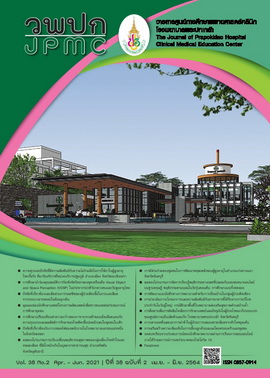Effects of a Health Behavioral Change Program on a Cardiovascular Risk Group of Overweight Public Health Officers in Thap Than District, Uthai Thani Province
Main Article Content
Abstract
BACKGROUND: Overweight or obesity is a major health problem in Thailand, which results in cardiovascular disease (CVD). Therefore, the prevention of occurring complications of CVD is crucial.
OBJECTIVES: To study the effect of a health behavioral change program on the food consumption and exercise behavior in a cardiovascular risk group of overweight public health officers.
METHODS: This quasi-experimental research was conducted among public health officers, in Thap Than District, Uthai Thani Province, Thailand, who had BMI≥23kg/m2, LDL-cholesterol130-190mg/dL, Thai CV risk score less than 10 percent, no underlying diseases, and were not taking any anti lipid drugs. Thirty participants were each assigned into the experimental group (EG) and control group (CG). The EG received cognitive behavioral therapy (CBT) for 12 weeks, which consisted of six sessions: (1) identify, evaluate, and recognizing negative thoughts; (2) modification of the eating behavior; (3) modification of the exercise behavior; (4) adjust the goals and find motivation; (5) skills consolidation and maintenance; (6) evaluation and the ending therapy. The CG received a general medical service. The data were analyzed by using descriptive statistics, paired t-test, and independent t-test. The significance level was denoted by 0.05.
RESULTS: At the end of the study, the mean overall scores of the lipid-lowering behavior had significantly increased from 78.1 (SD = 9.3) to 86.2 (SD = 5.3) in the EG (p < 0.001), and were also significantly higher than the CG (p < 0.001). When considering the mean scores in the part of the eating activities, the participants in the EG had increased their intake of fruits, vegetables and had a low consumption of sugar-sweetened beverages and fats. There was no difference in the mean scores of the lipid-lowering behavior in the part of the physical activities between both groups. In the EG, the mean LDL–cholesterol level had significantly decreased from 148.5 mg/dl (SD = 13.0) to 119.9 mg/dl (SD = 14.3) (p < 0.001), and it was also significantly lower than the CG (p < 0.001).
CONCLUSIONS: The research findings showed that this health program decreased LDL–cholesterol among overweight public health staff at 12 weeks. Therefore, a long-term follow-up of the behavioral change program would be necessary in order to maintain the behavioral change and reduce the incidence of CVD.
Article Details
References
Khamchata L, Wattana C, Harnirattisai T. The effects of a self-management program on self-management behaviors, waist circumference, blood sugar level, and cardiovascular disease risk among persons with metabolic syndrome. Nursing Journal 2017;44(3):65-76.
WHO. The top 10 causes of death [Internet]. 2018 [แited2018 Sep 17]. Available from: https://www.who.int/news-room/fact-sheets/detail/the-top-10-causes-of-death.
Ministry of public health. Public health statistics A.D.2017. Nonthaburi: Strategy and planning division; 2018.
Jahangiry L, Farhangi MA, Rezaei F. Framingham risk score for estimation of10-years of cardiovascular diseases risk in patients with metabolic syndrome. J Health PopulNutr [Internet]. 2017[cited 2019 Jan 25];13;36(1):36. Available form: https://jhpn.biomedcentral.com/track/pdf/10.1186/s41043-017-0114-0.pdf
Han TS, Lean ME. A clinical perspective of obesity, metabolic syndrome and cardiovascular disease. JRSM CardiovascDis[Internet]. 2016[cited 2019 Jan25]; 25;5:2048004016633371. Available form: https://journals.sagepub.com/doi/pdf/10.1177/2048004016633371
IntarakamhangU. Health literacy: measurement and development. Bangkok: Sukhumvit Printing; 2017.
Bandura A. Self-efficacy:the exercise of control. New York: W.H. Freeman & Company; 1997.
Kuanra-ngub S. Behavior modification programfor weight control of Payap University personnel. Nursing journal 2014;41(1):85-95.
Pityaratstian N, Ongarjsakulman Y, Maneeton N, Likhitsathian S, Thapinta D, Ratta-apha W, et al. Cognitive-behavioral therapy : CBT [Internet]. 2010 [cited 2019 Jun 27]. Available from: http://www.thaidepression.com/www/56/CBTdepression.pdf.
Hofmann SG.An introduction to modern CBT.psychological solutions to mental health problems. Chichester, UK: Wiley-Blackwell; 2011.
Zhang Y, Mei S, Yang R, Chen L, Gao H, Li L. Effects of lifestyleintervention using patient-centered cognitive behavioral therapy among patientswith cardio-metabolic syndrome: a randomized, controlled trial. BMC CardiovascDisord [Internet]. 2016[ cited 2019 Feb 14];16:227.Available form: https://bmccardiovascdisord.biomedcentral.com/track/pdf/10.1186/s12872-016-0398-9.pdf
Boonchaya-anant P. Obesity. In: Buranachapkajorn P, Wattanachanya L, Khovidhunkit W, (Eds.). Endocrinology and metabolism II. (3rd ed). Bangkok: Text and journal publication, 2019. p.712-723.
Garcia-Silva J, N Navarrete N, Peralta-Ramírez MI, García-Sánchez A, Ferrer-González MÁ, Caballo VE. Efficacy of Cognitive Behavioral Therapy in Adherence to the Mediterranean Diet in Metabolic Syndrome Patients: A Randomized Controlled Trial. J NutrEducBehav 2018;50:896-904.
Vaayeeta R, Chaosuansreecharoen KR. Chaichana B, Chaosuansreecharoen P. Effectiveness of a health behavior change program on self efficacy, self regulation, self care and weight loss among overweight health personal of Raman Hospital, Yala province. Nursing Journal of the Ministry of Public Health 2015;24(2):90-104.
Rongmuang D. Applying health promotion theories for behavioral modification to prevent and control obesity. J PrapokklaoHospClin Med Educat Center 2018;35:77-91.

